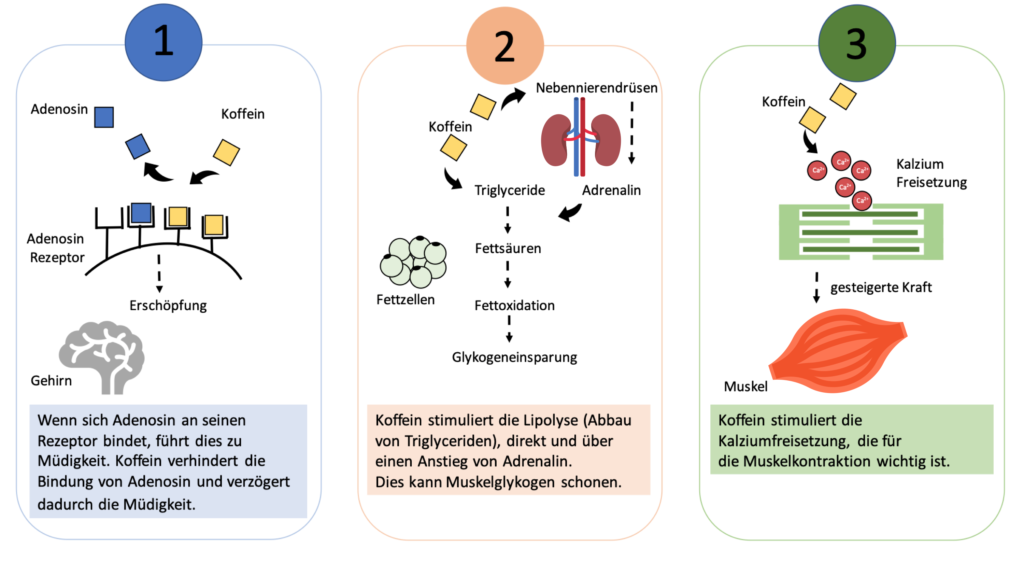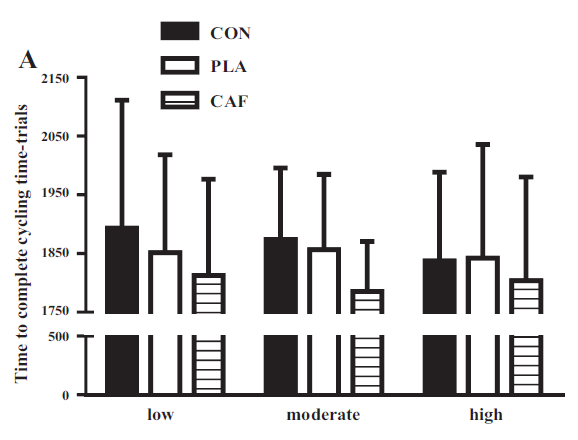Mechanism of Action of Caffeine
One of the main mechanisms by which caffeine exerts its performance-enhancing effect is by docking to adenosine receptors. This not only counteracts fatigue, but we also experience less pain (1).

Theory of the Habituation Effect
At least in animal studies, continuous caffeine intake has led to an increased concentration of adenosine receptors (2), which, at least in theory, should reduce the effectiveness with the same caffeine intake.
But can this observed effect also be transferred to humans and, above all, to athletic performance?
Performance Studies with and without Coffee Drinkers
In an elegant study design, Beaumont et al., 2017 investigated whether regular coffee consumption affects the effectiveness of caffeine (3)?
What Makes this Study so Special?
Compared to other studies, the subjects were not simply divided into a group with high or low caffeine consumption based on their current coffee consumption, but the participants all performed the performance test once with and without caffeine intake in a cross-over design. After that, half of the athletes consumed 3 mg of caffeine per kg of body weight daily for 3 weeks, the other half a low-dose carbohydrate capsule as a placebo.

After 3 weeks, the same performance test was then repeated with acute caffeine intake: 30 min on the bicycle ergometer, during which the performance was measured (total kJ).
The Result?
In the first performance test, both groups were able to increase their performance. In the placebo group, the performance increase could be repeated after 3 weeks. While the performance of the athletes who had consumed caffeine for 3 weeks in the meantime, a decrease in the measured work (kJ) decreased by 7.3%.
One Study Alone is not Enough
However, there are also studies that have found the opposite (4, 5, 6).
In an older study (4), 17 subjects were divided into two groups: non-coffee drinkers and consumers of more than 300 mg of caffeine daily. No differences were found between the two groups in a “time-to-exhaustion test”. This observation, in turn, supported the thesis that continuous caffeine intake has no negative effect.
Gonçalves et al. (5) divided 40 trained cyclists into 3 groups with low daily caffeine consumption (average = 58 mg per day), moderate consumption (average = 143 mg per day) and high caffeine consumption (average = 351 mg per day).
In a 30-minute “time-trial” test on the bicycle, all 3 groups showed improved performance compared to a placebo group, and more importantly for our question of the possible habituation effect, there were no differences in performance between people with low and high daily caffeine consumption.

Overall, the results are unfortunately not clear and further high-quality studies are needed to answer the question of a possible habituation effect.
But how should We Use Caffeine with our Athletes in the Meantime?
Does a Short-Term Withdrawal Help?
Here we can say with greater certainty that short breaks in caffeine intake do not help: because the two studies known to us have not been able to find any differences in performance with a withdrawal of 2-4 days (7, 8).
Our Interpretation of the Data
We cannot currently answer the question of a potential habituation effect clearly with YES or NO.
The decrease in performance is at least possible. But the effect – if it exists – will probably be very low with low daily caffeine consumption (see studies (4, 5, 6).
We therefore do not “forbid” our athletes from consuming coffee daily! Also, because it is an important ritual for many and contributes to socializing.
What we do, however, is limit the daily intake purely for enjoyment to 1 large cup of coffee. And we use caffeine as a supplement very specifically, and not before every training session, but only before “key sessions”, or when the athlete feels very tired. In the end, however, we always discuss the “caffeine strategies” and adapt them individually to the situation of each person.
Did you like the article? Then do us a favor and share the information with other athletes and coaches.
THANK YOU – your Team AthlEATCoach
